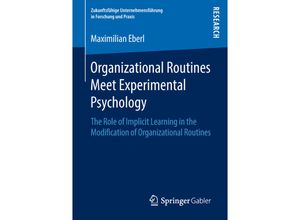Using an experimental approach Maximilian Eberl evaluates the role of implicit learning (CBM
AAT) for the modification of organizational routines. Taking a vertical perspective on the
(collective) entities in organizations shows an increasing role of impulsive processes the
lower the level gets. The horizontal perspective demonstrates the potential of implicit
learning for the replication of routines. Finally the time perspective highlights the
contributions of implicit learning strategies for change in and of routines as well as the
contributions of implicit learning to deal with the path-dependence of routines.



